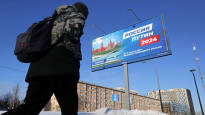Show elections, theater elections, propaganda elections and fraudulent elections.
The Russian presidential election is called many names, but one thing is certain: it is not about free, democratic elections.
Researcher at the Foreign Policy Institute Jussi Lassila calls the weekend’s presidential election a “dictatorship ritual”.
According to the researcher, it is precisely a ritual, with the help of which the Kremlin acquired formal support for Putin’s continuation, in fact a fake mandate.
According to Lassila, Finns should understand about the so-called presidential elections in Russia that the formally authentic-looking election situation is in reality a carefully orchestrated performance by the Kremlin, where all kinds of surprises are minimized.
Instead of the election result, you should follow the voter turnout
Another thing to understand about elections is that the election itself does not measure the popularity of the candidates.
According to the researcher, in the past the Kremlin has used the election theater to understand the attitude of Russians towards the state leadership.
– This election doesn’t really give the Russian administration any information about the real support of the president, says Lassila.
The election result is a weak reflection of the state of mind of Russians, but the turnout may reveal citizens’ dissatisfaction.
– If voter turnout remains low, it is of course a big problem for the Kremlin. Then the voting activity has to be manipulated.
In the previous elections in 2018, according to information from the Kremlin, 67.5 percent voted. Now the Kremlin is aiming for a turnout of 70–80.
Lassila estimates that the Kremlin wants to avoid the mistake of the Belarusian presidential election.
In 2020, the Election Commission of Belarus declared Alexander Lukashenko the winner with 80.2 percent of the votes cast. The voting percentage was reported as 84.
The citizens did not swallow the outrageous election fraud. Thousands of people joined huge opposition demonstrations, which were violently suppressed by Belarus.
– Even though there can be millions of votes that are born out of nowhere and dead souls from all over the world are marked as having voted, even an authoritarian system can’t do just about anything. The Kremlin needs to get proof that a clear majority has voted.
The Russian administration has actively pushed for an electronic election system, which makes it easier to tamper with the voter turnout. In this election, it is used in 29 regions of Russia.
In Russia, electronic voting was tested on a larger scale in 2021 during the Duma elections.
– Back then, it was already clear that an unfavorable result for the Kremlin could be turned into a favorable one through electronic voting.
The Kremlin has not let the real opposition get anywhere near the elections
The third thing to understand about the Russian elections is that none of Putin’s so-called rivals can really challenge him.
In addition to Putin, the Communist Party participates in the elections Nikolai Mikhailovich Kharitonovof the deceased Vladimir Zhirinovsky candidate of the Liberal Democratic Party, chairman of the Duma’s Foreign Affairs Committee Leonid Slutsky and representative of the Uusi kansa party, deputy speaker of the Duma Vladislav Davankov.
Lassila estimates that the Kremlin has built a competitive setup of Putin loyalists who have no political ambitions.
– A large part of the people of the liberal democratic and Uusi kansa parties are exactly like this. They lack genuine political ambition and operate within the limits defined as permissible for their model.
Although some of the members of the regional offices of the Communist Party are allied with Russian opposition forces, such as To Alexei Navalny with the team, the Center Party and Horitonov, who is participating in the presidential race, have not done it.
– He is a nondescript, completely gray dinosaur and even four years older than Putin. He was also the candidate of the Communists in the 2004 presidential election.
The election commission under the Kremlin blocked real opposition candidates Yekaterina Duntsova and Boris Nadezhdin standing for election.
Duntsova’s election theme would have been ending the war in Ukraine and releasing political prisoners. His candidacy was rejected due to “errors” in the application at the end of December.
Nadeždin’s trip to the elections ended when the Central Election Board invalidated more than 9,000 of the 104,734 supporter cards submitted to the election board.
Russians are not particularly excited about the upcoming elections
The death of opposition politician Alexei Navalny in a Siberian prison overshadows the Russian presidential election.
Navalny’s supporters have called on Russians to gather at the polling stations at 12 noon on Sunday and vote for anyone but Putin or tamper with the ballot.
A former Russian oligarch who spoke in Helsinki at the end of February Mikhail Khodorkovsky urged to write Navalny’s name on the ballot.
Also Navalny’s widow Yuliya Navalnaya has called for protests during the elections.
Lassila does not expect widespread protests during the presidential election.
According to the researcher, casting protest votes that would undermine the Kremlin’s ability to falsify specifically in the presidential election would require extraordinary organization from the Russians.
– Although Navalny’s death is a mobilizing factor, large-scale organizing is very difficult in the current circumstances.
– It has worked regionally in local elections, but nothing like that has been seen in the presidential elections in Russia.
A large protest wave may still be possible in the near future, Lassila estimates.
